Unit1What’s the matter
Unit1-what's-the-matter-教材语法解析
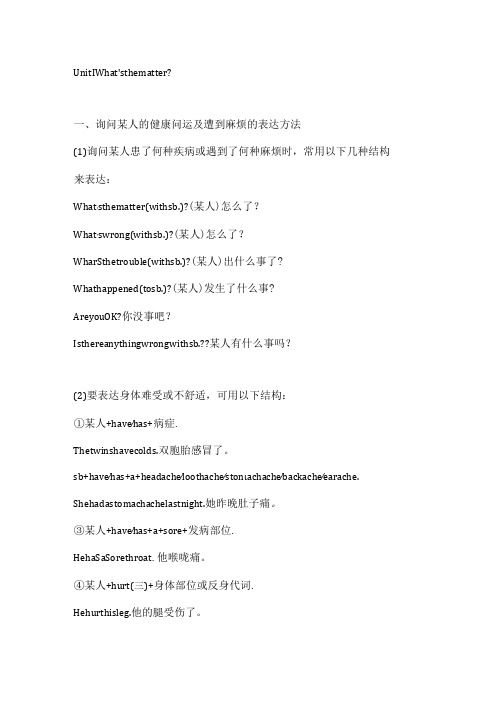
UnitIWhat'sthematter?一、询问某人的健康问运及遭到麻烦的表达方法(1)询问某人患了何种疾病或遇到了何种麻烦时,常用以下几种结构来表达:What,sthematter(withsb.)?(某人)怎么了?What,swrong(withsb.)?(某人)怎么了?WharSthetrouble(withsb.)?(某人)出什么事了?Whathappened(tosb.)?(某人)发生了什么事?AreyouOK?你没事吧?Isthereanythingwrongwithsb.??某人有什么事吗?(2)要表达身体难受或不舒适,可用以下结构:①某人+have∕has+病症.Thetwinshavecolds.双胞胎感冒了。
sb+have∕has+a+headache∕loothache∕stonιachache∕backache∕earache. Shehadastomachachelastnight.她昨晚肚子痛。
③某人+have∕has+a+sore+发病部位.HehaSaSorethroat.他喉咙痛。
④某人+hurt(三)+身体部位或反身代词.Hehurthisleg.他的腿受伤了。
⑤某部位+hurl(三).Myheadhurtsbadly.我头痛得厉害。
⑥某人+have∕has+apain+inone's+身体部位Ihaveapaininmychest.我胸口痛⑦(Thereis)soιnethingwrongwithone's+身体部位. Thereissomethingwrongwithmyrighteye.我的右眼有毛病。
⑧其他表达方式Shehasahearttrouble.她有心脏病。
Hegothitonthehead他头部受到了撞击。
Shecutherfinger.她割破手指了。
二、情态动词should的用法1.ShOIIld为情态动词,意为“应当:应当”,否定式为ShoUkIn'1,其后接动词原形,无人称和数的改变。
Unit1-what's-the-matter-教材语法解析
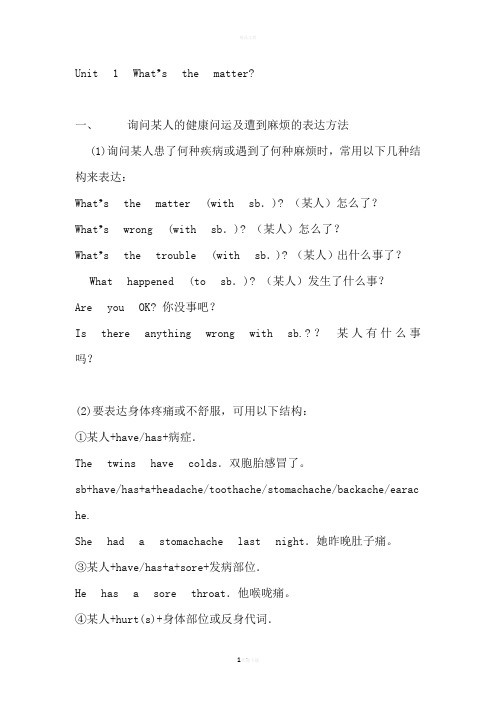
Unit1What’s the matter?一、询问某人的健康问运及遭到麻烦的表达方法(1)询问某人患了何种疾病或遇到了何种麻烦时,常用以下几种结构来表达:What’s the matter(with sb.)? (某人)怎么了?What’s wrong(with sb.)? (某人)怎么了?What’s the trouble(with sb.)? (某人)出什么事了?What happened(to sb.)? (某人)发生了什么事?Are you OK? 你没事吧?Is there anything wrong with sb.??某人有什么事吗?(2)要表达身体疼痛或不舒服,可用以下结构:①某人+have/has+病症.The twins have colds.双胞胎感冒了。
sb+have/has+a+headache/toothache/stomachache/backache/earac he.She had a stomachache last night.她昨晚肚子痛。
③某人+have/has+a+sore+发病部位.He has a sore throat.他喉咙痛。
④某人+hurt(s)+身体部位或反身代词.He hurt his leg.他的腿受伤了。
⑤某部位+hurt(s).My head hurts badly.我头痛得厉害。
⑥某人+have/has +a pain +in one’s+身体部位I have a pain in my chest.我胸口痛⑦(There is)something wrong with one’s+身体部位.There is something wrong with my right eye.我的右眼有毛病。
⑧其他表达方式She has a heart trouble.她有心脏病。
He got hit on the head他头部受到了撞击。
unit-1-what's-the-matter-教案

unit-1-what's-the-matter-教案(jiào àn)unit-1-what's-the-matter-教案(jiào àn)Unit 1 What’s the matter?教材(jiàocái)解读Go for it! 是以任务型语言教学(jiāo xué)为基础的英语教材,它体现(tǐxiàn)“以学生(xué sheng)为中心”和“以人为本”的教学思想,融话题、交际功能和语言结构于一体。
本书每个单元都列出明确(míngquè)的语言目标、主要的功能项目和语法结构、需要掌握的基本词汇,并分为Section A和Section B两部分。
Section A为目标句型提供分步事例和指导性练习;Section B使学生能够对已经学过的目标句型运用自如。
每个单元还附有Self Check部分,此部分是让学生用来测试自己现阶段的英语水平,即对本单元的语言目标的掌握程度有较为明确的认识。
第1单元(dānyuán)以What’s the matter?为中心话题(huàtí),让学生认知表示身体部1位的单词以及部分疾病的表达方法,描述身体不适和提出建议展开,学习和运用“What’s the matter?”和“What should…do?”让学生学会描述身体的不适和提出建议。
本课教材内容与学生的实际生活密切相关,易于引出学生运用简单的英语进行交际和交流,在学习活动(huó dòng)中,学生通过交换对身体不适的描述及建议,促进学生之间和师生之间的情感交流,增进情谊。
同时,在学习中养成良好的健康习惯。
单元(dānyuán)目标一、知识(zhī shi)与技能1. 知识目标:认知表示身体部位的单词以及部分疾病的表达方法。
Unit1 What's the matter 短语总结-背诵版

Unit1What's the matter?短语总结—背诵版一、短语总结1.“(某人)怎么了?”表达(3+2+1+1)1.What’s the matter/trouble/problems(with sb.)?2.What’s wrong/up(with sb.)?3.(Is there)anything wrong(with sb.)?4.What happened to sb.?2.happen(意外地)发生(happen-happened-happened)1.take place(有计划地)发生2.take one’s place=take the place of sb.取代/代替某人的位置3.sth.happen(ed)to sb.某事发生在某人身上4.sb.happen(ed)to do sth.某人碰巧做某事3.“身体部位疼痛or不舒服”的表达(4)1.have a+疾病名词(headache/stomachache/toothache/其他疾病)2.have a sore+身体部位3.身体部位+hurt(s)4.have a pain in the+身体部位4.accident1.accidental adj.意外的accidentally adv.意外地2.by accident=accidentally意外地3.by mistake错误地5.lie1.lie in位于......(内部)2.lie to位于......(相隔海/省)3.lie on位于......(接壤)4.Iie ylie躺;位于lie-lay-lain lying lie down躺下lie on/in/to位于撒谎lie-lied-lied lie to sb.对某人撒谎lie about sth.对某事撒谎lay放置;下蛋lay-laid-laid laying lay down放下6.上下车1.get on/off+a/the bus/plane/train/metro/subway2.get in/into/out of+a/the taxi/car/van7.think v.思考;认为(think-thought-thought)1.think about思考;考虑2.think over=think about carefully仔细考虑3.think of认为;想起What do you think of...?=How do you like...?你认为...怎么样?4.think twice再三考虑;谨慎考虑8.surprise n./v.(surprise-surprised-surprised)1.to one’s surprise令某人吃惊的是2.in surprise=surprisingly吃惊地3.be surprised at对......感到吃惊4.be excited about对......感到激动5.be interested in对......感兴趣9.trouble n.麻烦(不可数)1.have trouble/problems/difficulty(in)doing sth.做某事有麻烦/问题/困难2.get into trouble陷入麻烦3.be in trouble在麻烦中10.fall v./n.(秋天)(fall-fell-fallen)1.fall behind sb.落后某人catch up with sb.赶上某人2.fall in love with sb./sth.爱上...../与......相爱3.fall down掉下4.fall over摔跤5.fall down from...=fall off...从......掉下6.fall asleep睡着11.run v.跑/经营(run-ran-run)1.run after...追赶...2.run away逃跑3.sb.run out of sth.某人用光/耗尽某物4.sth.run out某物花光/耗光5.run a shop/company/restaurant经营一家商店/公司/餐馆e n./v.使用(use-used-used)1.be useful=be of use有用的2.be useless=be of no use没有用的3.be used to(doing)sth.习惯于(做)某事4.be used to do sth.被用来做某事ed to do sth.过去常常做某事13.help n./v.帮助(help-helped-helped)1.help(sb.)to do sth.帮助某人做某事2.help sb.with sth.在某方面帮助某人3.can’t help doing sth.情不自禁/忍不住做某事4.help oneself to sth.自便/自取......(随便吃/喝......)5.with one’s help=with the help of sth.在某人的帮助下6.ask sb.for help=turn to sb.向某人寻求帮助14.own adj.自己的v.拥有(own-owned-owned)owner n.拥有者1.sb.own sth.=sb.be the owner of sth.某人拥有某物2.on one’s own=by oneself=alone独自地3.one’s own+n.(单/复)某人自己的......15.mean v.意思是/打算(mean-meant-meant)adj.刻薄的;吝啬的meaning n.意思;意义meaningful adj.有意义的meaningless无意义的1.mean to do sth.打算做某事2.mean doing sth.意味着做某事16.mind v.介意/在意(mind-minded-minded)n.决心;心智;思想;头脑1.make up one’s mind(to do sth.)下定决心(做某事)2.change one’s mind改变某人的主意3.keep......in mind记住......4.lose one’s mind失去理智;发疯5.in one’s mind=in one’s opinion=in one’s view在某人看来6.mind sb./one’s doing sth.介意某人做某事7.Never mind.(用于安慰)没关系;别担心;不要紧17.cut v.切割/砍(cut-cut-cut)1.cut up=cut...into pieces切碎2.cut off切掉3.cut down砍倒4.cut...in half对半切开18.keep v.保持;继续(keep-kept-kept)1.keep doing sth.保持做某事2.keep sb.doing sth.让某人保持做某事3.keep on doing sth.=go on doing sth.继续做某事4.keep/stop sb.from doing sth.阻止某人做某事19.risk(risk-risked-risked)1.be at risk=be in danger有危险的/在危险中2.take a risk=take risks冒险3.take the risk of sth.=be at the risk of sth.冒着......的风险4.risk doing sth.冒险做某事20.expect v.期待(expect-expected-expected)1.expect(sb.)to do sth.期待(某人)做某事2.expect that从句期待+宾语从句21.sick adj.生病的(定语、表语)ill adj.生病的(只作表语)1.sick-sicker-sickest ill-worse-worst2.be sick of sth.厌烦某事3.be tired of sth.厌倦某事22.breath n.呼吸breathe v.呼吸(breathe-breathed-breathed)1.breathe fresh air呼吸新鲜空气2.hold one’s breath屏住呼吸3.take a deep breath深呼吸4.be out of breath上气不接下气23.ready adj.准备好的1.get/be ready to do sth.准备好做某事2.get/be ready for sth.为......做好准备24.其他短语1.be in control of sth.控制/掌管/管理某事2.take one’s temperature量某人的体温3.take the medicine吃药take pills吃药片4.the rest of sth./sb.剩下的某物/某人5.right away=right now=at once立刻;立即;马上6.get out of...从......出来/离开......。
Unit_1_What's_the_matter
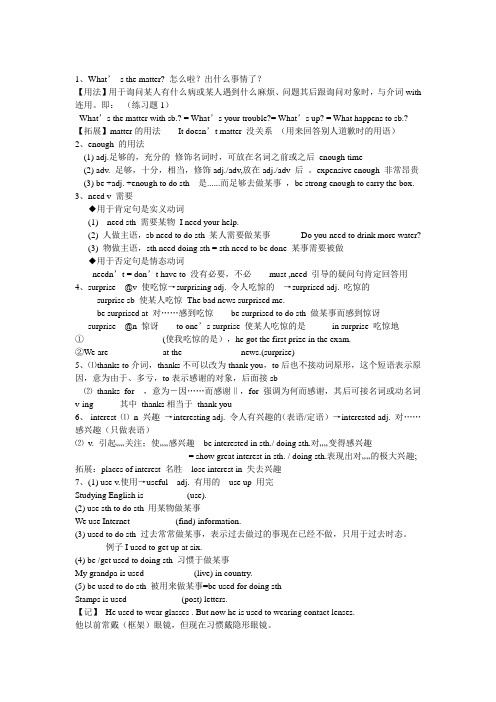
1、What’s the matter? 怎么啦?出什么事情了?【用法】用于询问某人有什么病或某人遇到什么麻烦、问题其后跟询问对象时,与介词with 连用。
即:(练习题1)What’s the matter with sb.? = What’s your trouble?= What’s up? = What happens to sb.? 【拓展】matter的用法It doesn’t matter 没关系(用来回答别人道歉时的用语)2、enough 的用法(1) adj.足够的,充分的修饰名词时,可放在名词之前或之后enough time(2) adv. 足够,十分,相当,修饰adj./adv,放在adj./adv 后。
expensive enough 非常昂贵(3) be +adj. +enough to do sth 是......而足够去做某事,be strong enough to carry the box.3、need v 需要◆用于肯定句是实义动词(1) need sth 需要某物I need your help.(2) 人做主语,sb need to do sth 某人需要做某事Do you need to drink more water?(3) 物做主语,sth need doing sth = sth need to be done 某事需要被做◆用于否定句是情态动词needn’t = don’t have to 没有必要,不必must ,need 引导的疑问句肯定回答用4、surprise @v 使吃惊→surprising adj. 令人吃惊的→surprised adj. 吃惊的surprise sb 使某人吃惊The bad news surprised me.be surprised at 对……感到吃惊be surprised to do sth 做某事而感到惊讶surprise @n 惊讶to one’s surprise 使某人吃惊的是in surprise 吃惊地①__________________(使我吃惊的是),he got the first prize in the exam.②We are ____________at the _____________news.(surprise)5、⑴thanks to介词,thanks不可以改为thank you,to后也不接动词原形,这个短语表示原因,意为由于、多亏,to表示感谢的对象,后面接sb⑵thanks for ,意为―因……而感谢‖,for强调为何而感谢,其后可接名词或动名词v-ing 其中thanks相当于thank you6、interest ⑴n 兴趣→interesting adj. 令人有兴趣的(表语/定语)→interested adj. 对……感兴趣(只做表语)⑵v. 引起……关注;使……感兴趣be interested in sth./ doing sth.对……变得感兴趣= show great interest in sth. / doing sth.表现出对……的极大兴趣; 拓展:places of interest 名胜lose interest in 失去兴趣7、(1) use v.使用→useful adj. 有用的use up 用完Studying English is__________(use).(2) use sth to do sth 用某物做某事We use Internet __________(find) information.(3)used to do sth 过去常常做某事,表示过去做过的事现在已经不做,只用于过去时态。
八年级英语下册 Unit 1 What’s the matter短语、句子练习(新版)人教新目标版
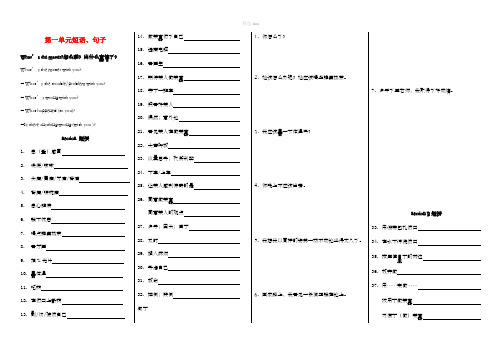
第一单元短语、句子What’ s the matter?怎么啦?出什么事情了?What’ s the matter with you?= What’s the trouble/problem with you?= What’ s wrong with you?= What happened (to you)?=Is there anything wrong (with you )?Section 短语1.患(重)感冒2.发烧/咳嗽3.头痛/胃痛/牙痛/背痛4.背痛/喉咙痛5.患心脏病6.躺下休息7.喝点蜂蜜热茶8.看牙医9.拍X光片10.量体温11.吃药12.在伤口上敷药13.割/切/擦伤自己14.做某事伤了自己15.远离电脑16.看医生17.期待某人做某事18.等下一班车19.照看好某人20.偶然;意外地21.看见某人在做某事22.大声呼救23.认真思考;权衡利弊24.下车/上车25.让某人感到惊奇的是26.同意做某事同意某人的观点27.多亏;因为;由于28.及时29.陷入麻烦30.考虑自己31.救命32.摔倒;跌倒句子1、你怎么了?2、她该怎么办呢?她应该喝些蜂蜜热茶。
3、我应该量一下体温吗?4、你晚上不应该出去。
5、我想我以同样的姿势一动不动地坐得太久了。
6、回家路上,我看见一条狗正躺在地上。
7、多亏了王老师,我取得了好成绩。
Section B短语33.用绷带包扎伤口34.在水下冲洗伤口35.按压住鼻子的两边36.放弃做37.用……来做……被用于做某事习惯于(做)某事38.让自己活得自在39.休息几天40.在烈日下41.感觉病了/感到不舒服42.划伤了膝盖43.流鼻血44.伤了背45.碰了头46.晒伤47.呼吸有问题48.被球打/碰了49.爬山(活动)50.去爬山51.对……有兴趣52.冒险53.失去生命54.因为55.亲自;独自56.(主语为物)耗尽;用光(主语为人)耗尽;用光57.准备做某事58.切掉他一半右臂59.失血太多60.左右为难;进退两难61.在困难的情况下62.摆脱;脱离63.学好英语的重要性64.做出好决定65.掌控一生66.坚持爬山67.活着还是死亡68.发生事故69.放弃做句子1、他在学习英语方面有困难。
unit1What's -the-matter-知识点及短语
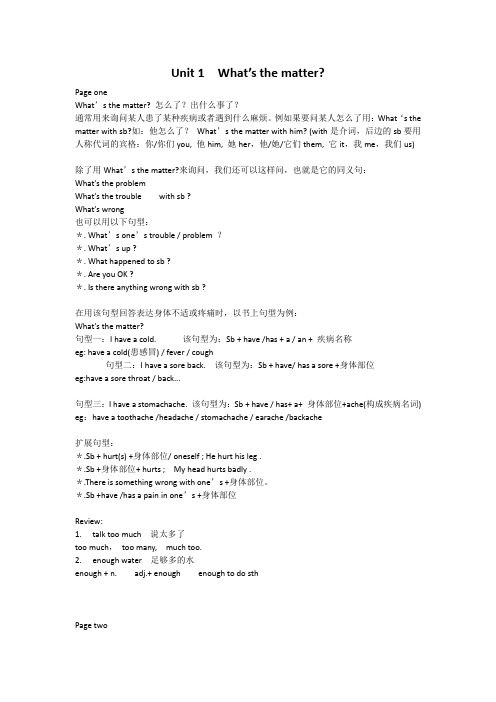
Unit 1 What’s the matter?Page oneWhat’s the matter? 怎么了?出什么事了?通常用来询问某人患了某种疾病或者遇到什么麻烦。
例如果要问某人怎么了用:What‘s the matter with sb?如:他怎么了?What’s the matter with him? (with是介词,后边的sb要用人称代词的宾格:你/你们you, 他him, 她her,他/她/它们them, 它it,我me,我们us)除了用What’s the matter?来询问,我们还可以这样问,也就是它的同义句:What’s the problemWhat’s the trouble with sb ?What’s wrong也可以用以下句型:*. What’s one’s trouble / problem ?*. What’s up ?*. What happened to sb ?*. Are you OK ?*. Is there anything wrong with sb ?在用该句型回答表达身体不适或疼痛时,以书上句型为例:What’s the matter?句型一:I have a cold. 该句型为:Sb + have /has + a / an + 疾病名称eg: have a cold(患感冒) / fever / cough句型二:I have a sore back. 该句型为:Sb + have/ has a sore +身体部位eg:have a sore throat / back...句型三:I have a stomachache. 该句型为:Sb + have / has+ a+ 身体部位+ache(构成疾病名词) eg:have a toothache /headache / stomachache / earache /backache扩展句型:*.Sb + hurt(s) +身体部位/ oneself ; He hurt his leg .*.Sb +身体部位+ hurts ; My head hurts badly .*.There is something wrong with one’s +身体部位。
八年级英语下册 Unit 1 What’s the matter知识点总结、作文 (新版)人教新目标
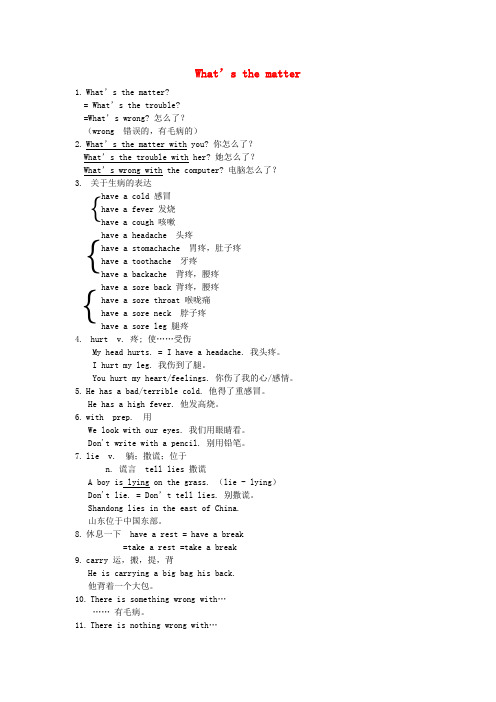
What’s the matter1.What’s the matter?= What’s the trouble?=What’s wrong? 怎么了?(wrong 错误的,有毛病的)2.What’s the matter with you? 你怎么了?What’s the trouble with her? 她怎么了?What’s wrong with the computer? 电脑怎么了?感冒发烧咳嗽头疼胃疼,肚子疼牙疼背疼,腰疼背疼,腰疼喉咙痛脖子疼腿疼疼; 使……受伤My head hurts. = I have a headache. 我头疼。
I hurt my leg. 我伤到了腿。
You hurt my heart/feelings. 你伤了我的心/感情。
5.He has a bad/terrible cold. 他得了重感冒。
He has a high fever. 他发高烧。
6.with prep. 用We look with our eyes. 我们用眼睛看。
Don't write with a pencil. 别用铅笔。
7.lie v. 躺;撒谎;位于n. 谎言 tell lies 撒谎A boy is lying on the grass. (lie - lying)Don't lie. = Don’t tell lies. 别撒谎。
Shandong lies in the east of China.山东位于中国东部。
8.休息一下 have a rest = have a break=take a rest =take a break9.carry 运,搬,提,背He is carrying a big bag his back.他背着一个大包。
10.There is something wrong with………有毛病。
11.There is nothing wrong with………没毛病。
- 1、下载文档前请自行甄别文档内容的完整性,平台不提供额外的编辑、内容补充、找答案等附加服务。
- 2、"仅部分预览"的文档,不可在线预览部分如存在完整性等问题,可反馈申请退款(可完整预览的文档不适用该条件!)。
- 3、如文档侵犯您的权益,请联系客服反馈,我们会尽快为您处理(人工客服工作时间:9:00-18:30)。
Then, the bus driver got off and asked Swohmate hpaapspseenngeedr. s helped him to move the man to the bus.
At 9:00 a.m yesterday, bus No.26 was going along Zhonghua Road when the driver saw an old man ______ on the side of the road. A woman _____ to him was ____for help.
1.Why was Wang Ping surprised that passengers agreed to go to the hospital with him?
2.Did the passengers think Wang Ping did the right think? How do you know?
4.If you don’t work hard,you’ll get into trouble_____(look)for a good job.
expect he trouble think passenger
to
other think time
He ______ most or all of the passengers to get off and wait for the next bus. But _____ his surprise, they all agree to go with him. Some ______ helped Mr. Wang to move the man onto the bus. _____ to Mr.Wang and the passengers, the doctors saved the man in ____." It`s sad that many people don`t want to help ___ because they don`t want any _____," says one passenger. "But the driver didn`t think about . He only ____ about saving a life.
1.To my surprise,the little boy has one ______.(foot)
2.When I got home,I saw my mother_____(lie) on the sofa and watching TV.
3.We all except our English teacher_____(rest) well because he is so tired all day.
The doctors saved the man in time. The driver But the driver didn`t think about himeself.He only thought about saving a life.
quick next should stop two shout what lie
needed to go to the hospital right away.
4. _______ The passagers on the bus did not want to go to the hospital, so only Wang Ping went with the woman and old man.
The bus driver,24-year-old WangPing, _____ the bus without thinking ____.He got off and asked the woman ___ happened. She said that the man had a heart problem and ____ go to the hospital. Mr. Wang knew he had to act ____.He told the passengers that he must take the man to hospital.
3. Do you agree that people often do not help others because they don’t want to get into trouble?Why or why not?
陷入困境,不可数
At 9:00 a.m yesterday
Zhonghua Road the driver of bus No.26,Wang Ping. the passengers, an old man
√ 1. _______ Wang Ping was the driver of bus
No.26 at 9:00 a.m. yesterday.
2. _______ Bus No. 26 hit an old man on Xhonghua Road.
√ 3. _______ The old man had a heart problem and
√ 5. _______ Some passagers helped to get the old
man onto the bus.
√ 6. _______ The old man got to the hospital on
time.
3c Discuss the questions with a partner.
Unit1 What’s the matter?
What’s the matter?
对
stomachache
症
ቤተ መጻሕፍቲ ባይዱ
下
药 toothache
fever
sore throat
3b. Read the passage again and check the things that happened in the story.
